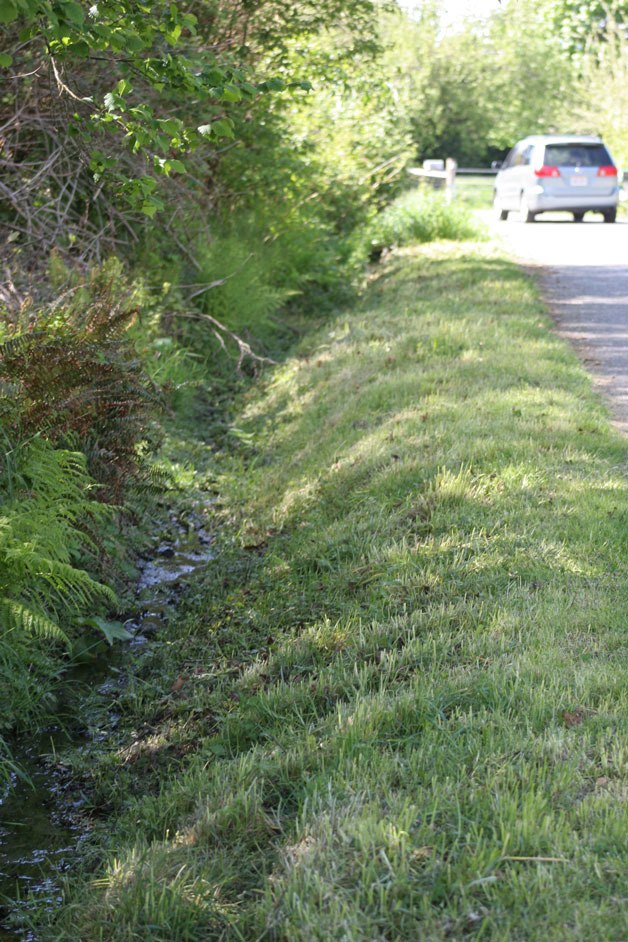The Langley City Council should take a final vote on the Langley Passage development, the developer’s told the city in a letter sent today, or the developer will take the city to court.
Douglas Kelly, the Clinton attorney representing Whidbey Neighborhood Partners, the builders of the Langley Passage development, urged the council to reconsider its rejection of the 20-home subdivision on the city’s eastern end and rescind the council’s initial vote taken on Nov. 1.
And if the city is serious about avoiding future landslides of the bluff along Edgecliff – a primary reason for the city council’s refusal to approve the project — it can require the developer to extend a sewer line down Edgecliff Drive.
Kelly told the city in a Jan. 12 letter that Whidbey Neighborhood Partners wants the city to make a decision, one way or the other, “at the earliest available time.”
He also said a court would find the council’s decision against Langley Passage as “clearly erroneous, arbitrary and capricious and contrary to law.”
City officials would not comment on the letter Wednesday.
Larry Cort, the city’s planning director, said he had just received a copy of the letter and forwarded it to Carol Morris, the city’s legal counsel.
“We literally just got this thing,” Cort said. “We’ll probably know a little bit more after Carol weighs in and has a chat with the mayor.”
Councilman Robert Gilman said he had not seen the letter, and could not comment on Langley Passage given the quasi-judicial nature of the process. (In quasi-judicial actions, council members assume the role of a judge and their actions are limited to official proceedings.)
Nearby neighbors to the Langley Passage project, and the Whidbey Environmental Action Network, have opposed the new subdivision since its start more than four years ago, largely due to concerns that additional development along Edgecliff Drive will push water runoff toward the unstable bluff overlooking Saratoga Passage, where many critics of the project own homes. The Edgecliff bluff has a long history of landslides, and experts have said that waves hitting the bottom of the bluff during high tides are the main culprit in the cliff’s instability.
Kelly pointed to the expert studies that have been conducted since 2008 and noted the city’s own consultant had said water from the project would not be discharged to the bluff.
“In short, the record before the city demonstrates unequivocally that the concern about the development somehow destabilizing the cliff is without merit,” Kelly wrote.
“If the city chooses to deny the plat, Whidbey Neighborhood Partners is prepared to address these issues to the courts, and to seek damages from the city of Langley as a result,” he added.
Kelly also said, however, that the developer was ready to amend its utility plan for the project to include a sewer line extension down Edgecliff Drive and across a neighboring property to the Langley Passage site. He noted that existing property owners were adding to the instability of the Edgecliff bluff, and the best way to protect the bluff was to extend a sewer line that would eventually mean the end of septic systems in the neighborhood.
“The largest adverse impact of development on the stability of the bluff is the 70-plus homes along the bluff that receive public water from the city of Langley, but then pump that water through facets, showers and toilets into septic systems on the bluff,” Kelly said in his letter.
“If each such home uses on average 177 gallons of city water a day, each home pumps nearly 65,000 gallons of water per year into the bluff. The single biggest mitigation that could be provided to improve the stability of the bluff would be to put a sewer line in Edgecliff Drive, so that over time, as the homes are sold or expanded, they could be hooked up to the sewer and taken off septic systems,” Kelly continued. “The public benefit of running a sewer line down Edgecliff will be to over time remove the largest single source of water being added to the bluff as a result of development.”
Edgecliff residents have opposed a sewer line along their street in the past, due largely to the costs of hooking up, and Kelly said it was doubtful that Langley would be able to get a sewer line in place without the development of Langley Passage.
“If the city council wants the development of Langley Passage to contribute to reducing the instability of the bluff, this is the only way that can be accomplished. It is also likely the only opportunity the city will have to get a sewer line installed in Edgecliff Drive,” he said. “It seems highly unlikely that the current homes along Edgecliff will agree to pay for a sewer line through an LID [local improvement district], there are no other properties that are likely to extend a sewer line as part of their development, and the prospect that the city will be able to afford to extend a sewer line down Edgecliff with its own resources is remote.”
Kelly indicated the developer had gotten approval from a nearby property owner for an easement for a new sewer line, and also a new water line.
He also asked the city to put the resolution of Langley Passage on the next council agenda, and approve the development with the additional requirement of a sewer line extension or take a final vote to deny the application so the developer can take the city to court.
Cort, Langley’s planning director, said a sewer line has been in the city’s capital facilities plan for years and is included in Langley’s 2006 comprehensive sewer plan.
The cost for a sewer line down the entire length of Edgecliff Drive, a total of 3,300 linear feet of pipe from Noble Creek to the city limits at the end of Edgecliff, was estimated at $260,000 in 2006 dollars.



